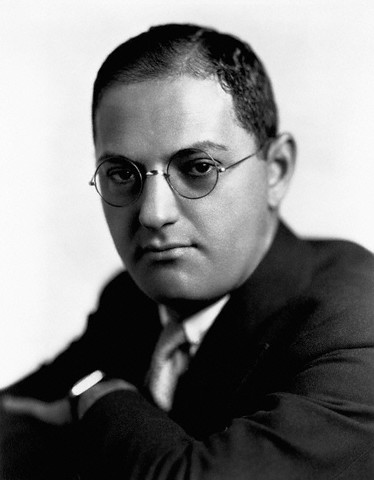In Celebration of the Human Voice - The Essential Musical Instrument
Home | Doo Wop | Barbershop | World | Contemporary | Christian | Vocal Jazz | Choral | Christmas | Instructional | Arrangements
Classical | Opera | Musicals | Personality | Young Singers | Disney | Videos | Songs | The Artists

Ira Gershwin Biography

Click Here for Sheet Music and Songbook Vocal Arrangements
Gershwin was born Israel Gershowitz in New York City, the oldest of four children of Morris (Moishe) and Rose Gershovitz (nee Rosa Bruskin), who were Russian Jews, born in St Petersburg, who had emigrated to the US in 1891. Ira's siblings were George, and Frances. Morris changed the family name to "Gershwine" (or alternatively "Gershvin") well before their children rose to fame; it was not spelled "Gershwin" until later. Shy in his youth, Ira spent much of his time at home reading, but from grammar school through college he played a prominent part in several school newspapers and magazines. The childhood home of Ira and George Gershwin was in the center of the Yiddish Theater District, on the second floor at 91 Second Avenue, between East 5th Street and East 6th Street. They frequented the local Yiddish theaters. While George began composing and "plugging" in Tin Pan Alley from the age of 18, Ira worked as a cashier in his father's Turkish baths. It was not until 1921 that Ira became involved in the music business. Alex Aarons signed Ira to write the songs for his next show, Two Little Girls in Blue, ultimately produced by Abraham Erlanger, along with co-composers Vincent Youmans and Paul Lannin. So as not to appear to trade off George's growing reputation, Ira wrote under the pseudonym "Arthur Francis", after his youngest two siblings. His lyrics were well received, allowing him successfully to enter the show-business world with just one show. Later the same year, the Gershwins collaborated for the first time on a score; this was for A Dangerous Maid, which played in Atlantic City and on tour. It was not until 1924 that Ira and George teamed up to write the music for what became their first Broadway hit Lady, Be Good. Once the brothers joined forces, their combined talents became one of the most influential forces in the history of American Musical Theatre. "When the Gershwins teamed up to write songs for Lady, Be Good, the American musical found its native idiom." Together, they wrote the music for more than 12 shows and four films. Some of their more famous works include "The Man I Love", "Fascinating Rhythm", "Someone to Watch Over Me", "I Got Rhythm" and "They Can't Take That Away from Me". Their partnership continued until George's sudden death from a brain tumor in 1937. Following his brother's death, Ira waited nearly three years before writing again. After this temporary retirement, Ira teamed up with accomplished composers such as Jerome Kern (Cover Girl); Kurt Weill (Where Do We Go from Here?; Lady in the Dark); and Harold Arlen (Life Begins at 8:40; A Star Is Born).( Over the next 14 years, Gershwin continued to write the lyrics for many film scores and a few Broadway shows. But the failure of Park Avenue in 1946 (a "smart" show about divorce, co-written with composer Arthur Schwartz) was his farewell to Broadway. As he wrote at the time, "Am reading a couple of stories for possible musicalization (if there is such a word) but I hope I don't like them as I think I deserve a long rest." In 1947, he took 11 songs George had written but never used, provided them with new lyrics, and incorporated them into the Betty Grable film The Shocking Miss Pilgrim. He later wrote comic lyrics for Billy Wilder's 1964 movie Kiss Me, Stupid, although most critics believe his final major work was for the 1954 Judy Garland film A Star Is Born American singer, pianist and musical historian Michael Feinstein worked for Gershwin in the lyricist's latter years, helping him with his archive. Several lost musical treasures were unearthed during this period, and Feinstein performed some of the material. Feinstein's book The Gershwins and Me: A Personal History in Twelve Songs about working for Ira, and George and Ira's music was published in 2012 |
Select a Category |
Want to Sing? - Find a Chorus Near You
List of Choruses by State | List of Choruses by City
